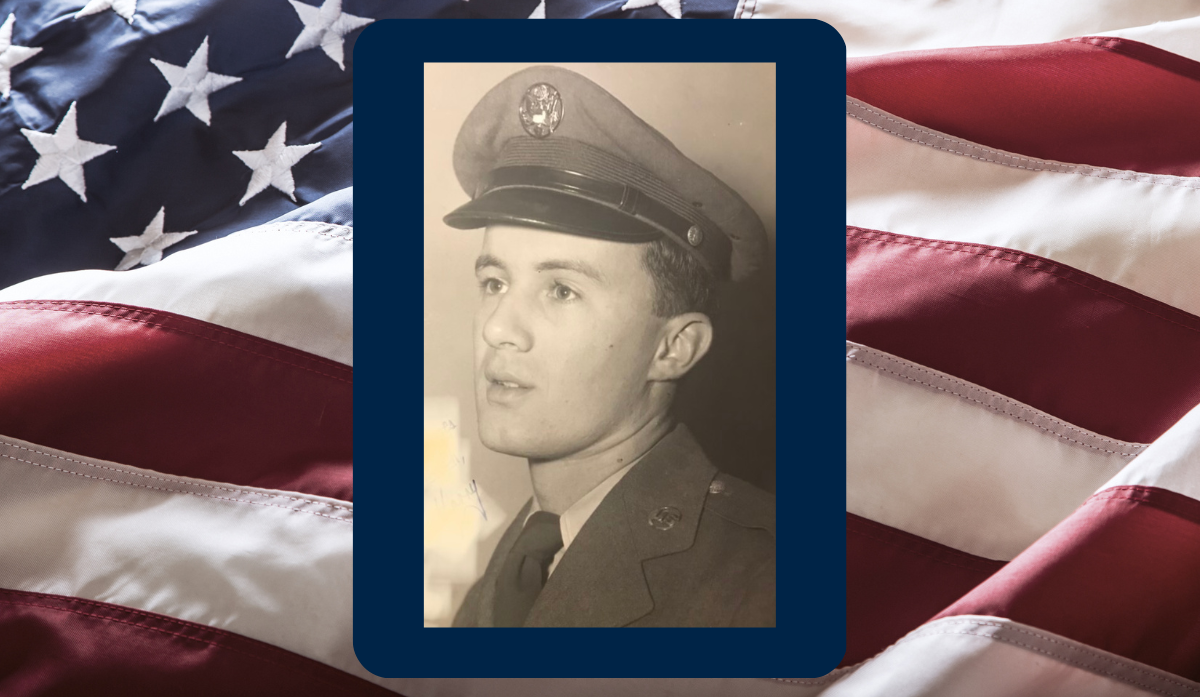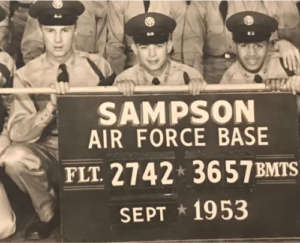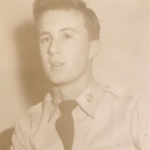Harry T. Delk: Veteran of the Month | July 2022
 Harry T. Delk was born in Flushing, NY, in 1935, as the Great Depression was nearing an end. His father was in the Army, and the family was transferred to New Jersey when his father was stationed at Fort Dix. The family eventually moved to Athens, NY, and lived with their grandfather in the house where his mother was born. Delk, about seven years old at the time, remembers the day his grandfather came running out of the house onto the front porch yelling, “The Japs have bombed Hawaii!” Delk shared, “And that was my recollection of the beginning of the war.” When WWII started, Delk’s father, who was already in the Army, was immediately sent overseas to England and eventually served throughout portions of Europe.
Harry T. Delk was born in Flushing, NY, in 1935, as the Great Depression was nearing an end. His father was in the Army, and the family was transferred to New Jersey when his father was stationed at Fort Dix. The family eventually moved to Athens, NY, and lived with their grandfather in the house where his mother was born. Delk, about seven years old at the time, remembers the day his grandfather came running out of the house onto the front porch yelling, “The Japs have bombed Hawaii!” Delk shared, “And that was my recollection of the beginning of the war.” When WWII started, Delk’s father, who was already in the Army, was immediately sent overseas to England and eventually served throughout portions of Europe.

Harry T. Delk top holding flag in 1955
Delk’s mother started working in a local factory making the davits that went onto lifeboats that then went on the merchant ships. Delk’s mother was part of the “Rosie the Riveter” movement that is credited with bringing women into the workforce during WWII. For the first time, women were accepted and encouraged into the workforce while also creating massive changes to industry regulations and giving women a chance to help their country in a patriotic way. Delk stated, “The women really held up their end of the bargain. Not only did they have to raise a family, but they also had to work and bring in income. My mother, like all the women in town, did what she had to do to help her family sustain itself.”

Delk left at basic training in 1953
When the war was over in 1945, Delk’s father was sent to Nürnberg with hundreds of men as part of the security team for the Nürnberg War Trials. Delk explained the security around the city and trial was “staggering.” According to Britannica.com, The Nürnberg trials were a series of trials held in Nürnberg, Germany, in 1945 and 1946 following the end of World War II. Former Nazi leaders were indicted and tried as war criminals for their conduct by the International Military Tribunal. Delk’s father was discharged and sent home at the close of the trials.
Growing up in Athens Delk remembered with a laugh, “I had basically three interests A)cars, B)girls, and C)making part-time money.” Athens was a small, close-knit community where everyone was either related or friends. After graduating high school in 1953, Delk received a notice from the selective service organization in Washington DC congratulating him that he had been selected as a 1A draftee for the United States Army. Delk had thirty days to decide whether he would be drafted into the Army or enlist in another branch. With his father being an Army man, Delk stated, “Navy was out of the question.” Delk sat down with his father, and with his advice and guidance, he decided the best place for him would be the Air Force. Delk was excited at the thought of working on planes, and by early August 1953, Delk was enlisted in the United States Air Force. Delk recalled, “As a kid coming out of high school, I was a smart alec who thought I knew everything and had the answers to everything that would ever matter. I learned very, very quickly that does not go down well in the military. At all.”

Delk was sent to the Sampson Air Force Base in upstate New York for basic training and then to Keesler Air Force Base in Biloxi, MS. During his year at Keesler, Delk was trained in radio and radar navigation equipment repair before being sent to Europe. Delk spent the next three years stationed at various Air Force bases in France, Germany, Holland, North Africa, and Italy. The multiple bases were used to train F86 pilots in air to air, air to ground bombing requirements, in different geographical locations. When asked what his job overseas involved, Delk explained, “The pilots of the airplanes complete their training, and as mechanics, we went along with them to take care of the airplanes.” Delk described his time overseas, recalling a volatile time at Fürstenfeldbruck Airbase in October of 1956, stating, “There was a red alert, and there was word around the base that the Russians had invaded Budapest, Hungary. So we went on immediate alert of 12 hours on 12 hours off, and planes were in the sky constantly. They would land, we would fix what was wrong, they would change pilots and back in the air again. That went on for probably 30-40 days until the crisis ended.” Delk laughed, “Most of the guys, including me at maybe 19 years old at the time, were thinking this is exciting, but when do we get a three-day pass.” Delk continued, “We did some meaningful things. Did we have fun? Yes, we did. Did we learn things? Absolutely. Did I progress in terms of ranking? Yes, I did, which I was proud of.”
When asked what the military taught him, Delk responded, “You learn discipline, you learn to take orders, to go from A to B to C, you learn good order, you learn skills, you practice the skills, and you put them into some sort of a reasonable productive manner in working with them.” He concluded by saying, “It was the most maturing, the most meaningful thing in terms of this young kid who needed to get his life together and realize what I really needed to do to make something of myself in this life. If it wasn’t for the Air Force, I don’t think that would ever have happened.”
Delk was offered an opportunity to reenlist, including promotion in rank and a sign-on bonus with the option to pick any base. Still, after thinking long and hard about his future, he decided to utilize his GI bill and get an education. Initially, Delk started college at a small school in the Adirondacks called Paul Smiths College of Arts and Sciences, where he met his future wife, a local girl named Pat. Delk then transferred to Syracuse to finish his undergraduate degree before deciding to stay for graduate school for Personnel Relations, later known as Human Resources.
The Delks were married in 1959 while he was a junior at Syracuse studying Business Administration. Pat Delk worked to help support the newlyweds while he finished college. After graduating college, three and a half years into their marriage, the Delks welcomed their first child, a boy. The Delks went on to have two more children, both daughters.

Delk family in California in the summer of 1985
As Delk was offered job opportunities and advancements in his career, the family moved to almost a dozen different states over the years. Delk had a chance to work for Xerox Corporation, a brand new and quickly growing company at the time. Eventually, Delk was recruited to a company in California called Sysorex. After about a year, the company’s owner asked him to run the business affairs in Saudi Arabia. Delk’s oldest son was enlisted in the Navy then, so his wife and two daughters moved with him for six years to Riyadh, the Capital of Saudi Arabia. Due to the country’s regulations on education of non-Muslim children, Delks company paid for his daughters to attend boarding school in Europe near the Swiss Italian border. Delk exclaimed, “The girls saw things and did things they would’ve never been able to do otherwise, and the company paid all fees and expenses. The girls have never regretted it, and it has opened up a lot of opportunities for them.” The conservative restrictions placed on women in the Middle East also meant Mrs. Delk wasn’t allowed to work as she had in America. This allowed her to visit her daughters for several months at a time or return stateside to visit family.

Harry and Pat Delk in 2014
In 1998, after 22 total years at Sysorex, Delk decided to retire. The couple, upon recommendation, decided to look at Lake Wyllie in South Carolina and really loved the area. Now, empty nesters, the couple settled down into a retirement routine. Two of their children live in SC, and the youngest in Washington DC. They have one grandson as well.
Unfortunately, after 63 years of marriage, Pat Delk passed away in early December due to Alzheimer’s. Delk said the key to their marriage was one word, compromise. Delk declared, “I was in love when I got married, and I was in love 63 years later.” Delk went on to say, “God has blessed me in many different ways. There is no question about that. It’s only been a little over six months, and of course, I miss her desperately, naturally. But I stay busy. I have a lot of volunteer stuff that I do with the lions club, and I am very active in my church teaching bible study classes, I have a lot of friends I meet for coffee, a minister from church comes to see me once a week, I teach Sunday school at worship service, and for a long time, I sang in the choir, so I keep myself busy. So I don’t have a whole lot of time to wallow in a pity party because I don’t believe in them anyway.”

Delk family Christmas in 2021
When Delk was asked about his feeling on the Korean Conflict being known as the forgotten war, he responded, “At the time that it was going on, it was a very big deal. It was a dangerous time and a dangerous place to be. The idea of people thinking it was the forgotten war, I understand where they are coming from, but for someone like me who was there at the time and knew what was going on and felt the vibrations all around me, and I wasn’t the only one, there were literally thousands and thousands of us who felt the same thing, it was I can assure you, anything other than a forgotten war during those years.”
Veterans Care Coordination is proud to recognize Harry T. Delk for his service to our country. We are privileged to have the opportunity to share the stories of our nation’s heroes. Thank you for your service, Harry, and welcome home.
